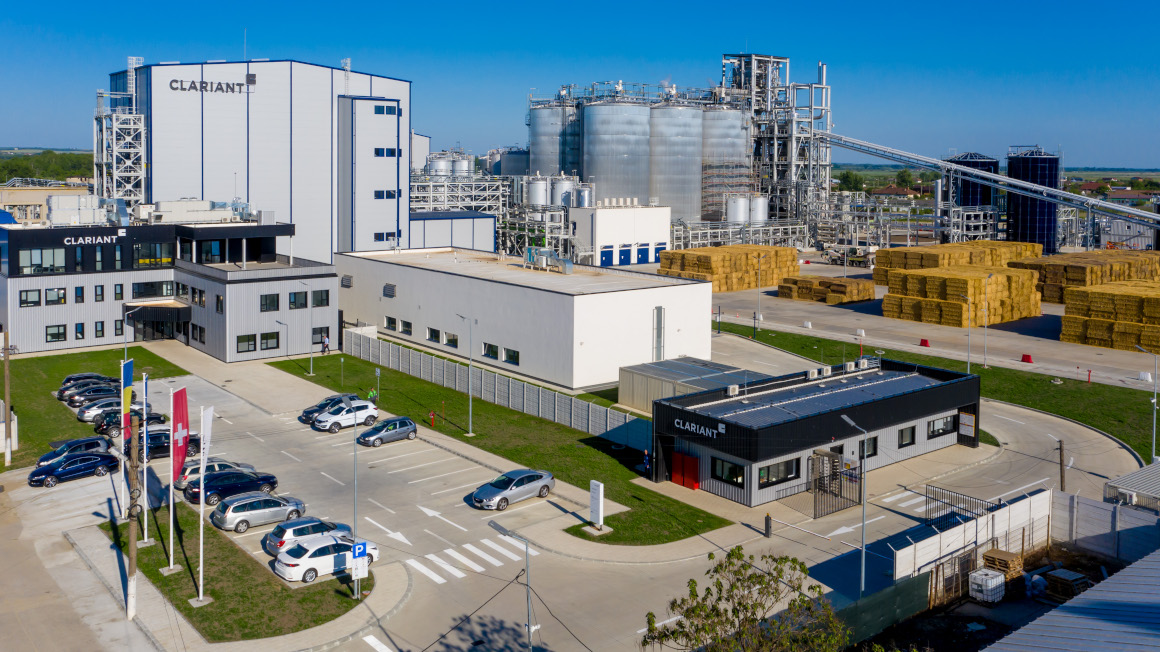Clariant: End of commercial biorefinery in Romania
The Swiss specialty chemicals company Clariant is discontinuing the loss-making production of cellulosic ethanol from straw at its plant in Romania, which was only opened in 2022. Corresponding activities in Straubing, Munich and Planegg will also be shut down.

Straw to fuel: It was the first large-scale plant for the commercial production of cellulosic ethanol, a second-generation biofuel, which started operations in Podari, Romania, in June last year. Now the specialty chemicals group Clariant has surprisingly announced the end of the new plant. As the Swiss company announced on December 6, the Board of Directors decided to close the flagship plant for ethanol production using the Sunliquid process. Development activities at the German sites in Munich, Planegg and Straubing are also to be scaled back accordingly.
"Sustained losses not economically feasible"
The decision was preceded by a strategic review after it became clear that the plant would not be able to meet the targeted operational parameters. As a result of the review, Clariant's management concluded that the "continued ramp-up of the Podari plant would require significant additional investment" and is "not economically viable for Clariant given the ongoing losses". "For an innovation-driven company like Clariant, it is imperative to make clear decisions when a project does not meet expectations and to implement our sustainable growth strategy even more consistently," said Conrad Keijzer, Chief Executive Officer of Clariant.
EU and German government support biorefinery concept
Clariant has invested a total of CHF 240 million in the flagship plant in Romania. The construction of the large-scale biorefinery plant was also supported by the EU with EUR 40 million as part of the Bio-Based Industries Joint Undertaking (BBI).
With an annual production capacity of 50,000 tons, around 250,000 tons of wheat straw and other cereal straw from local farmers were to be processed each year. Sales in the mid double-digit million range were expected. However, there were apparently major technical problems in processing the heterogeneous raw material on an industrial scale, as the newspaper Frankfurter Allgemeine Zeitung (FAZ) writes. As a result, production volumes fell far short of targets. According to the FAZ, the new plant generated operating losses in the double-digit millions quarter after quarter.
The Sunliquid process was originally developed by a team at Süd-Chemie in Munich, which was acquired by Clariant in 2011. In the biotechnological process, the lignocellulose contained in the plant fibers is broken down into smaller sugar molecules with the help of microorganisms and enzymes, which are then fermented by yeasts into ethanol in a further step.
This technology has been successfully tested in a demonstration plant in Straubing, Bavaria, since 2012. The plant complex, built at a cost of 28 million euros, produces 1,000 tons of cellulosic ethanol per year from wheat straw and other field waste. The construction of the plant was funded with 5 million euros each by the Federal Ministry of Education and Research and the Free State of Bavaria.
Clariant strives for a socially acceptable solution
According to initial estimates, the closure of the plant in Podari, including the reduction of activities in Germany, will cost Clariant around CHF 60 to 90 million. A further CHF 110 million will be added due to write-downs on the asset value of the Romanian plant. The closure will affect 120 employees at the plant in Podari as well as around 50 employees at the pilot plant in Straubing and those working in the development laboratories in Planegg near Munich. Clariant announced that it would "work closely with employee representatives in Romania and Germany to find solutions that are as socially acceptable as possible".
bb/pg


